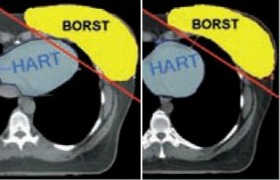Inhaling deeply diminishes radiation damage to heart of breast cancer patients
Patients undergoing radiation therapy for left-sided breast cancer have a higher risk of developing cardiovascular disease. However, Mirjam Mast, researcher at the Bronovo hospital in The Hague, Netherlands, has found a simple solution: holding your breath during irradiation. This reduces heart damage, she writes in her dissertation.
Mast investigated the added value of Active Breathing Control (ABC) during radiotherapy, a method that increases the space between breast tissue and the heart. By inhaling deeply, the diaphragm and heart move downwards, enabling the radiotherapist to target breast cancer tissue while omitting the heart and coronaries.
The ABC method encompasses wearing a nose clamp, breathing through a tube and monitoring your own breathing patterns on a screen. When the lungs are sufficiently filled with air, the tube closes and irradiation begins. By pressing a button, patients can halt irradiation and take a breath in between the sessions. This is repeated until the total radiation time of two to three minutes is reached.
In the study, 175 patients with left-sided breast cancer were included, receiving radiotherapy in combination with ABC. This lowered the radiation dose of the left anterior descending artery of the heart by fifty percent and significantly diminished damage to the coronary arteries compared to irradiated patients without ABC. Furthermore, the new procedure did not take up additional time apart from an once-only hour of breathing practice.
Because of these promising results, Mast writes: “We advise to implement the breath-controlled technique in all patients with left-sided breast cancer, without any age restrictions or criteria for breast size.”
Sources: Dissertation Mirjam Mast, LUMC, Piccolo patient magazine MCH
MedZine writes about notable science twice a week.







